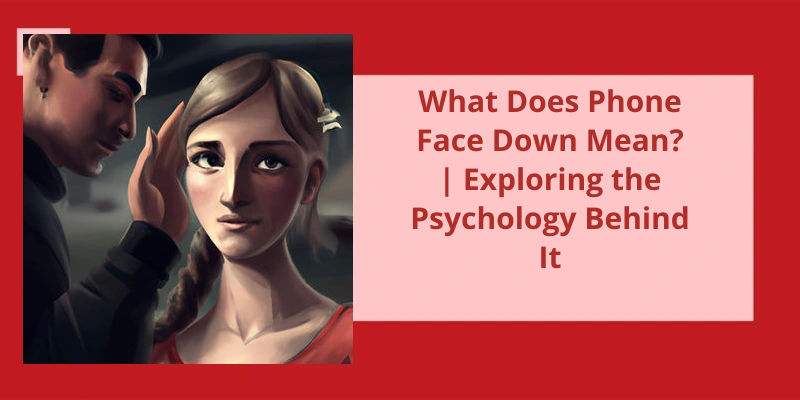Humans are social creatures who often seek validation and attention from others. However, what happens when one desires attention from an individual they don’t particularly like or enjoy being around? This paradoxical situation may arise from various reasons, including envy or jealousy, a lack of self-worth, or even feelings of isolation. Additionally, some individuals exhibit attention-seeking behavior as a symptom of an underlying personality disorder. Regardless of the cause, this behavior can have detrimental effects on relationships and personal well-being. It’s essential to seek professional help to identify and address the root cause of this behavior to achieve healthy and fulfilling relationships.
Is It Normal to Crave for Attention?
It’s important to note that craving attention isn’t necessarily a bad thing. As social creatures, humans thrive on connection and interaction with others. Seeking attention can be a way to fulfill our innate need for acceptance and validation. In fact, attention-seeking behaviors are often a natural part of development for children and adolescents who’re still learning about themselves and their place in the world.
However, the desire for attention can become problematic when it becomes the primary motivation behind a persons actions. This can lead to behaviors that are aggressive, destructive, or manipulative in nature. When people feel that they aren’t receiving the attention they crave, they may resort to desperate measures to get noticed. This can include acts of self-harm, drug or alcohol abuse, or even criminal behavior.
One of the biggest risks associated with attention-seeking behavior is that it can be a sign of an underlying mental health issue. For example, individuals with borderline personality disorder may exhibit extreme behaviors in order to receive attention and emotional validation from others. Similarly, individuals with depression or anxiety may feel that they need constant attention in order to feel validated or reassured.
It’s important for parents and caregivers to be aware of the signs of attention-seeking behavior in children and adolescents, and to seek professional help if necessary. By addressing underlying mental health issues and providing healthy ways for individuals to fulfill their need for attention, we can help prevent high-risk or unacceptable behaviors.
While it’s normal to crave attention, it’s important to recognize when it becomes unhealthy or disruptive.
The Effects of Social Media on Attention-Seeking Behavior
Social media has been known to increase attention-seeking behavior in some individuals. Research suggests that the constant need for validation and attention through likes and comments on social media posts can lead to a cycle of seeking even more attention. Additionally, social media can normalize attention-seeking behavior, making it more acceptable in society. As a result, individuals who engage in this behavior online may also exhibit it in real life situations. However, it’s important to note that not everyone who uses social media engages in attention-seeking behavior and that other factors may contribute to this behavior as well.
It’s easy to mistake the feeling of wanting attention for genuine romantic interest in someone. However, there are certain signs that indicate it’s the former and not the latter. If you find yourself feeling anxious without their time or attention, being emotionally unavailable, or not caring to know much about them beyond the surface, then it’s possible that you’re attracted to the attention they give you rather than them as a person. Superficial qualities also tend to be more appealing to those who crave attention rather than genuine connection.
How Do You Know if You Like Someone or You Just Want Attention?
It’s difficult to differentiate between genuine feelings of attraction and a desire for validation from someones attention. In such cases, people often mistake the latter for the former, leading to confusion and misunderstandings in romantic relationships. One way to identify if youre seeking attention is through anxiety and restlessness when youre not around them. You crave their time and attention to feel satisfied, rather than seeking genuine emotional connection.
Another sign of seeking attention rather than actual interest is emotional unavailability and a tendency to close yourself off. You might put up walls and resist vulnerability, indicating a disinterest in establishing a deeper connection with the other person. It’s easy to mistake a superficial fixation with someone for true attraction, and this can manifest in the form of keeping your guard up and avoiding true emotional intimacy.
Lack of interest in their personal life or deeper qualities is another indicator of wanting attention over genuine mutual attraction. If youre not invested in getting to know the person beyond the surface level, it could suggest that youre not interested in establishing a deeper emotional connection. In these cases, the qualities you find desirable in the other person may be superficial characteristics rather than true compatibility.
Furthermore, if youre only interested in someones attention, you might not be bothered about their interests, hobbies, or personality traits that don’t align with your own preferences. True attraction goes beyond physical appearances and shallow qualities as it involves a profound connection with the other person and a desire to get to know them holistically.
Knowing whether you like someone or just want attention isnt always clear-cut. However, recognizing the signs of wanting validation from seeking a genuine emotional connection can help avoid disappointment and heartbreak in the long run. It’s essential to take the time to evaluate your own feelings and motives honestly and be upfront with the other person about what you want from the relationship. Only then can you establish a mutually fulfilling and meaningful relationship based on mutual compatibility and respect.
In dealing with attention-seeking behavior, it’s important to keep in mind that giving attention, whether positive or negative, can perpetuate the problem. Reactive strategies like ignoring the behavior and providing alternative consequences can help break the cycle. However, it’s also important to consider positive reinforcement for desired behavior and recognize that even reprimands can provide attention. So, what’re some proactive strategies to prevent attention-seeking behavior from developing in the first place?
How Do I Get Rid of Attention-Seeking Behavior?
Attention-seeking behavior can be frustrating and challenging to deal with, but it’s important to understand that this behavior is often a sign of deeper emotional or psychological issues. Therefore, it’s crucial to handle attention-seeking behavior with care and empathy. Reactive strategies can help in managing and reducing such attention-seeking behaviors. One of the most common reactive strategies is to ignore the behavior altogether. By providing the least amount of attention, the individual is less likely to maintain the problem behavior. However, it’s essential to remain consistent with this approach as any fluctuations could result in elevated attention-seeking behavior.
For example, instead of responding to an individuals attention-seeking behavior with frustration, one can redirect their focus into more positive activities that require their attention. This approach can be encouraging for the individual to develop better ways of seeking attention rather than through negative behavior. In establishing an alternative consequence, consistency is vital because any inconsistency can worsen the attention-seeking behavior.
Paying attention to someone else is yet another strategy in managing attention-seeking behavior. However, it’s essential to note that while giving positive attention to someone else, it’s crucial to remain cautious not to neglect the individual who’s seeking attention in a negative way.
Finally, it would be best to remember that providing a reprimand is still providing attention. Reprimanding an individual even when necessary should be handled with care. It’s essential to address the behavior in a more positive light by providing alternative solutions that might help in reducing the negative behavior. Besides, the individual should be encouraged to seek more positive attention through positive reinforcement such as praising positive behavior.
Managing attention-seeking behavior requires empathy, patience, and consistency. Importantly, it’s essential to remember that any positive reinforcement towards positive behavior can help in reducing negative attention-seeking behavior. Understanding the individuals emotional or psychological issues that underlie the behavior is essential in providing the right intervention.
Causes of Attention-Seeking Behavior: It Would Be Helpful to Explore in More Detail What Emotional or Psychological Issues May Be Underlying Attention-Seeking Behavior. Some Possible Causes Could Include Anxiety, Low Self-Esteem, or a Need for Control.
Exploring possible emotional and psychological causes may help to understand attention-seeking behavior, such as anxiety, low self-esteem, or a need for control.
Conclusion
In conclusion, wanting attention from someone we don't like can be a complicated and multi-faceted issue. It may be symptomatic of underlying mental health conditions or past experiences that are influencing our behavior. The important thing is to recognize when attention-seeking becomes a problem, and seek professional help to address root causes and develop healthy coping mechanisms. By doing so, we can move towards more fulfilling, authentic relationships with others and ourselves. Ultimately, it’s through self-awareness, acceptance, and personal growth that we can find the connection and validation we genuinely desire.






